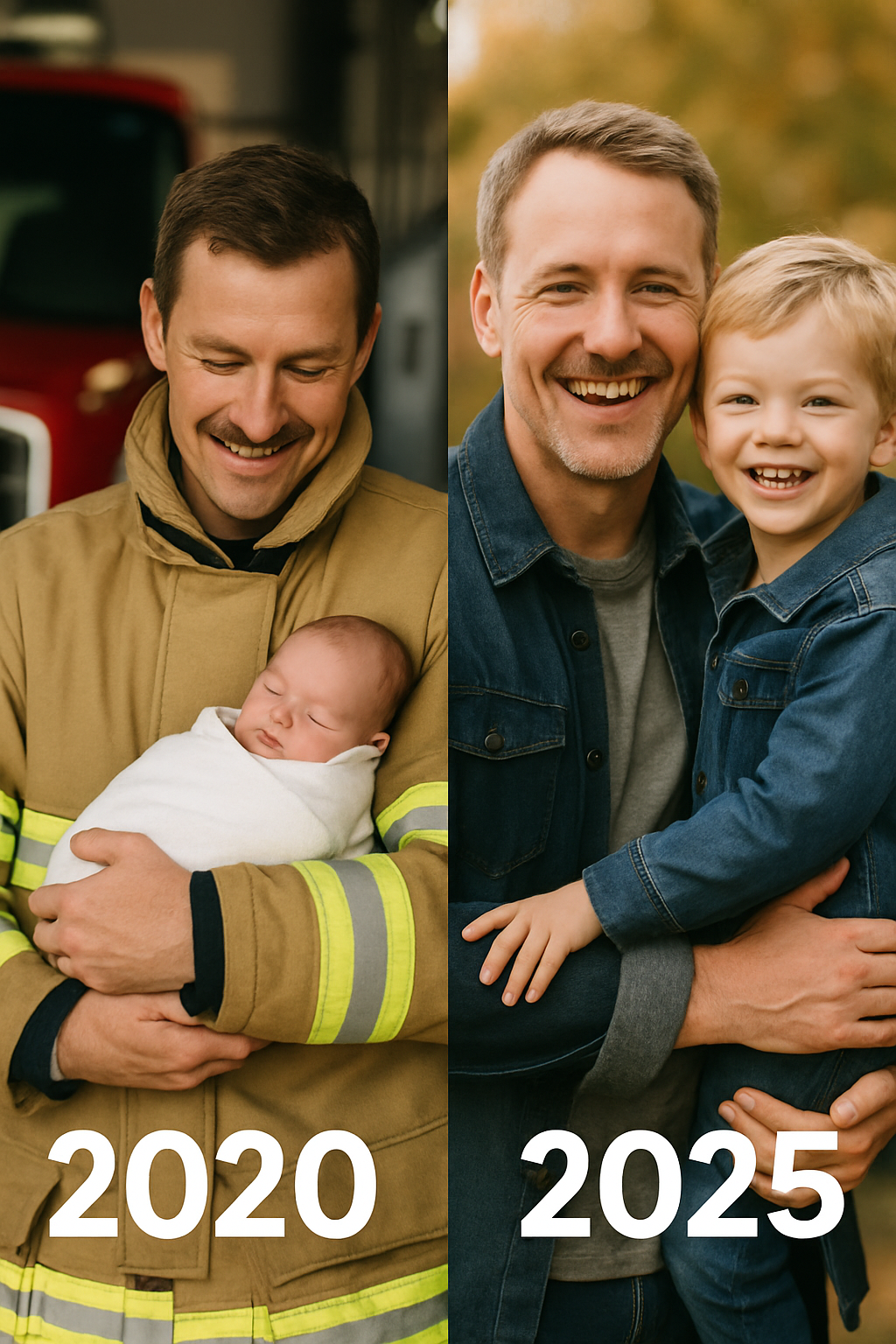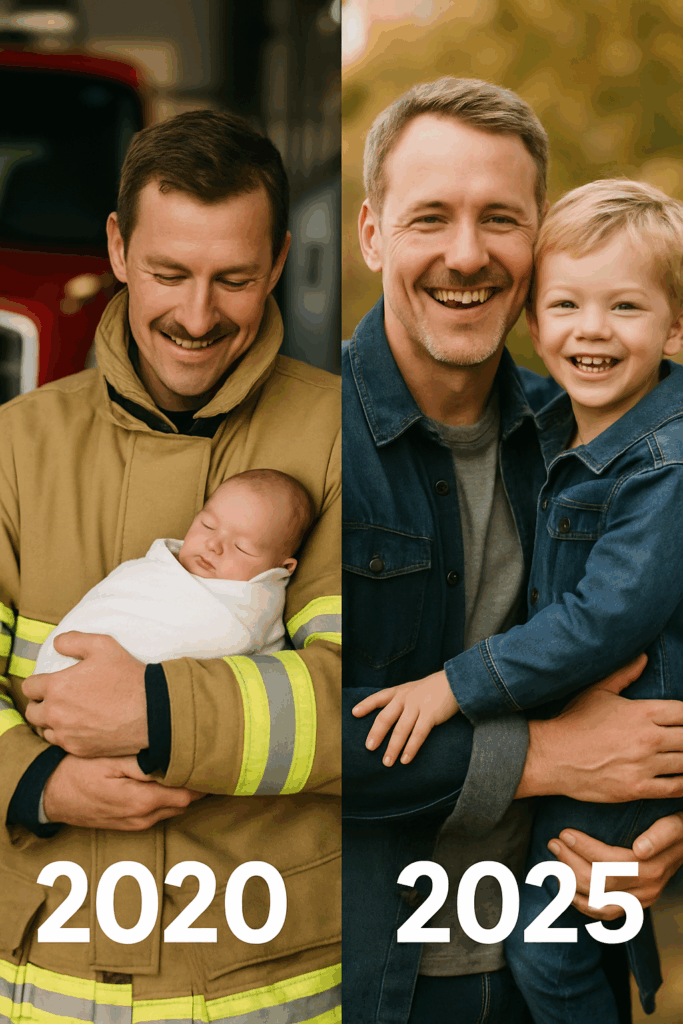It was a Tuesday night in early December — the kind of cold that made the air feel sharp enough to cut.
Snow drifted across the asphalt outside Station 14, where I’d worked for nearly fifteen years. I was used to the stillness between calls — the hum of the heater, the smell of coffee that had burned an hour too long.
But that night, the quiet broke with a sound I’ll never forget.
A cry. Soft. Fragile. The kind of sound that cuts straight through instinct.
“Did you hear that?” my partner, Eddie, asked.
We followed the sound out to the front steps — and that’s where we saw him.
A wicker basket. A threadbare blue blanket. And inside it, a baby.
He was barely a week old. Tiny fists clenched tight, his face red from crying, a hospital band still on his ankle. There was a note pinned to the blanket: His name is Noah. Please keep him safe.
Eddie cursed under his breath. “We need to call CPS.”
I nodded — but I couldn’t look away from the baby. His cries were weaker now, more like whimpers. I scooped him up, and he fit perfectly in the crook of my arm — small, warm, trembling.
Something in me shifted. I’d pulled people from burning cars, carried children out of smoke. But this… this felt different.
It felt like finding someone I’d been missing without even knowing it.

CPS came within the hour. They took Noah, wrapped him carefully, and promised to “do everything by the book.”
But every night afterward, I heard that cry in my head. I’d go home, sit in the silence of my empty apartment, and picture that tiny face. I couldn’t stop thinking — what kind of mother leaves her baby? What kind of world makes her think she has to?
Two months later, I called the social worker. “No family has come forward,” she said. “No matches, no claims.”
Something inside me clicked.
“Then I want to adopt him,” I said.
She hesitated. “You’re single, Mr. Keaton.”
“I’m also steady, clean record, and I’ve got room in my life — and my heart — for him.”
She laughed softly, almost sadly. “We’ll start the process.”
3Becoming a Father
It took nearly eight months of paperwork, interviews, home visits, and sleepless nights of doubt. But the day I finally brought Noah home, the world seemed to rearrange itself. He fit in my arms like he’d been born there.
I named him Eli — after my grandfather, a quiet man who once told me, “Family isn’t made of blood. It’s made of the ones you’d bleed for.”
Eli grew fast. He had my stubbornness and my laugh — or maybe I just learned to laugh like him. He loved dinosaurs, peanut butter sandwiches, and racing me to the mailbox.
Every birthday, I told him the story of how I found him. He’d giggle and say, “So I came from the firehouse!”
And I’d smile, hiding the ache behind my ribs.
Because part of me always wondered who she was — the woman who left him. And why.
Five years later, on a quiet Sunday evening, Eli and I were building a cardboard T-Rex in the living room. The rain drummed softly against the windows.
Then came a knock at the door. It was gentle at first — then firmer.
I wiped my hands and opened it.
A woman stood there, drenched from the rain. Early thirties, pale, her coat hanging loose like she’d run miles. Her hands trembled, but her eyes — God, those eyes — were fierce.
“Are you… Daniel Keaton?”
I nodded slowly. “Yes. Can I help you?”
Her voice cracked. “You have my son.”
I froze. “I’m sorry?”
Tears streaked her face. “You have my child. The baby from the fire station. You have to give him back.”
The Woman Who Claimed My Son
Her name was Rachel Ward. We sat across from each other in my kitchen. She clutched a mug of coffee she didn’t drink.
“I was twenty-four,” she began. “No family. No money. I’d just escaped an abusive relationship. I thought leaving him somewhere safe was the only way to keep him alive.”
She swallowed hard. “But I made a mistake. A big one.”
I listened — half angry, half aching for her.
She said she’d spent the next few years rebuilding her life — therapy, work, searching records, calling agencies. Then she saw a photo online — a fire department newsletter, featuring me and Eli at a charity event.
“I knew him instantly,” she whispered. “His eyes… they’re mine.”
I said nothing. The room felt too small, too sharp.
“You can’t just show up after five years and—”
“He’s my child,” she said, her voice shaking. “Please. I never stopped loving him.”
She slid an envelope across the table — court papers, DNA results, legal documentation in progress.
I didn’t touch them. I couldn’t. Because inside me, something was splintering.
The next weeks were a blur of lawyers, social workers, and courtrooms. Rachel’s story checked out. DNA confirmed it — she was Eli’s biological mother. But the law wasn’t simple. Because she had surrendered him anonymously, she had forfeited her rights.
Still, she fought. She said she was coerced by fear, that she’d been in hiding from an abusive ex who’d since gone to prison.
And I — I was caught between fury and pity.
My attorney told me I had a solid case to keep full custody. But every night, I’d watch Eli sleeping and think — what if I’m the one keeping him from something he deserves to know?
One night, I found him sitting on the stairs, listening.
“Dad,” he said softly, “is she… bad?”
I knelt down. “No, buddy. She’s not bad.”
He looked at me, eyes wide. “But you’re my dad.”
“I always will be,” I whispered. “No matter what happens.”
He hugged me tight, and I felt his heartbeat against my chest — steady, certain, home.
The Day in Court
The courtroom smelled like coffee and fear. Rachel sat across from me, her hands twisting a tissue. Her lawyer argued about second chances, redemption, the bond of blood. Mine spoke of stability, love, the home I’d built. When it was her turn to speak, Rachel stood — trembling, eyes wet but steady.
“I left him because I thought it was the only way to save him,” she said. “But I’ve never stopped being his mother.”
Then she turned to me.
“And I know you love him. I can see it in everything you do. But he deserves to know where he came from.”
Something in her voice — soft, sincere — disarmed the anger I’d been holding. The judge took weeks to decide. When the letter finally came, I sat on the porch, Eli’s laughter echoing from inside.
Joint custody. She would be allowed supervised visits, gradual introductions, therapy-led transitions.
I exhaled, half relief, half dread. Because part of me had feared losing him completely. And another part feared what it would mean to share him.
The first meeting took place at a family center. Eli clutched my hand the whole way there, his small fingers damp with nerves. When we walked in, Rachel stood by the window, a small stuffed dinosaur in her hand.
“Hi, Eli,” she whispered.
He looked up at me, then back at her. “You look like me.”
She laughed through tears. “Yeah. I guess I do.”
They played quietly at first — drawing, building with blocks. But when she started telling him stories about the stars, he leaned closer.
Afterward, in the parking lot, she turned to me.
“Thank you,” she said. “For keeping him alive. For loving him.”
I nodded. “He’s everything.”
She smiled faintly. “He’s both of ours now.”
And for the first time, I believed her.
Months passed. The visits continued. Rachel was gentle, patient, and genuine. Eli began to talk about her more — about the stories she told, the songs she sang. And I found myself… grateful. But then, one evening, something strange happened.
Eli came home quiet. I asked how his visit went. He said, “Mommy Rachel said when I’m older, I’ll live with her full-time.”
I froze. “She said that?”
He nodded. “She said the judge just has to change his mind.”
My chest tightened. I called my lawyer. Then Rachel.
She didn’t answer. When I finally saw her at the next session, I confronted her.
She looked stricken. “I never said that, Daniel. I swear.”
But there was something in her eyes — guilt, or fear — that made my stomach twist.
Two weeks later, a police officer came to my door. They were investigating a man — Victor Hale — recently released from prison. He’d been Rachel’s ex-boyfriend. Violent history. They found letters in his apartment — dozens, written to Rachel, obsessing over “getting the boy back.” My blood ran cold.
“Do you think he knows about Eli?” I asked.
The officer sighed. “We think so.”
That night, I called Rachel. She broke down.
“He found me,” she sobbed. “He’s been following me. I told him about Eli months ago — I didn’t mean to, I was scared.”
“Rachel…”
“I didn’t think he’d ever get out. I just wanted to see my son again before he did.”
The pieces fell into place. The visits, the urgency, the knock at my door — all of it had started when her past came looking for her.
We went back to court for protection orders, new custody terms, safety protocols. The judge, seeing the danger, granted me full custody again.
Rachel didn’t fight it. She just looked tired — hollow, almost relieved.
Afterward, she came to see us one last time. She knelt beside Eli and kissed his forehead.
“I’ll always love you,” she whispered. “Always.”
Then she turned to me. “Take care of him, Daniel. You’re the father he was meant to have.”
And she left — disappearing into the rain like the night she’d arrived.
Five Years Later
Eli is ten now. He plays soccer, collects fossils, and still builds dinosaurs out of cardboard. Sometimes he asks about Rachel. I tell him she loved him enough to let him go — twice. Every Christmas, we get a card. No return address, just a small note:
“He’s still roaring. Thank you.”
And I always whisper back, even if she can’t hear: “He’s home.”


